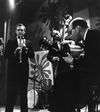
My apologies for a late post again – busy with music and things and sporadic ill-health... but onwards... I saw a great post on Jazz pour Tous (scroll down and down until you come to it – it will be an interesting journey which is why I don't give the direct link) about the Jimmy Guiffre album 'Freefall' – one of the sessions that ironically put his career into freefall for many years with their radical movements away from his previous work. And that got me to remembering his work with the trio that famously recorded 'Train and the river' – not just a high spot of the film 'Jazz on a Summer's Day' but a track that caused ripples onward into the sixties acoustic folk underground in England – in the circle of guitarists who were combining the older folk tradition with blues and jazz inflections – and significantly started to look outside their own culture, in the case of Davey Graham and the Incredible String Band, especially, towards Middle Eastern music and beyond. I'm thinking about people like Bert Jansch who played a variant of 'Train and the River' and John Renbourne, their combined forces in Pentangle, Stefan Grossman and a horde of unsung others. Charles Mingus was also a big influence – Davey Graham's arrangement of 'Better git in in your soul' is what I'm starting off with today. A tortuous line described... but the elliptical is how this blog is created in the main...

It could be argued that when Guiffre explored the free jazz/improv territory he embraced a more european ethic in timbre and harmony and put too much distance between himself and the blues... maybe. But it's good to remember how rooted he was not just in the blues (as a white reeds player – problematic? I don't think so, actually – forward: Jack Teagarden, the great trombonist – and exemplary blues singer – who may have been part Indian but was certainly regarded as 'white'). But also his take on folk music... The Big T also came from – Texas, which was Giuffre's birthplace. More needs to be written about the sublime mixtures of musics that exist and still do in that state but for my purposes today I just want to consider a line that goes from Giuffre – here represented by 'Crawdad Suite' and 'Two Kinds of Blues' – loping, free and easy material from the 'Train and the River' sessions - back to an earlier Texan musician: the blues singer and guitar player Blind Lemon Jefferson.
 So let's listen to some twenties country blues from a deep originator of the style and some fifties jazz that references those roots indirectly.
So let's listen to some twenties country blues from a deep originator of the style and some fifties jazz that references those roots indirectly.Other thoughts – Jim Hall's bluesy guitar playing help to create the folk/blues pastoral down home atmosphere evoked by these tracks. And Giuffre used to call his earlier Fifties music: 'Blues-based folk jazz.' Which wouldn't be far off some of what Davey Graham and company were attempting at times... When you put blues and folk music into the frame of the fifties and sixties I would argue that it explains a lot of the subsequent development of the avant-garde. Ornette was also from Texas and there is always somewhere in his music, not just that vocalised tone that the great sax players achieve but further, to stretch a metaphor, 'the rooster-crow' voice of the blues (also the bedrock for most -but not all – great jazz instrumentalists). Albert Ayler is probably the most obvious practitioner who seemed to take sustenance by foregrounding the folk elements of his music – the marches and deceptive simplicity of some of his themes. Note that this also uses the idea of collective improvisation – harking back to the New Orleans heritage. But beyond that there are also the global intrinsic freedoms of folk music to consider which also involve instrumental embellishment and improvisation and stretching songs to the demands of the moment beyond the purview of written scores. The freedoms of the blues singers – Lightning Hopkins and John Lee Hooker suggest themselves readily as does, say, Bukka White who declared that his songs were plucked 'out of the air' – to bend the twelve bar form to their own ends as and when desired.
These are interesting issues: much of the sixties new thing can be seen as a reconsidering of older traditions not just in jazz for the elements of freedom that they contained – and not just in European/American music but further afield... African, Indian, Arab, Asian – outwards...
Also – that jazz had a wider effect on Sixties popular music indirectly than may sometimes be realised – via the folk underground in some instances...
Download
Davey Graham
Better Git it in your soul
Buy
Blind Lemon Jefferson
Download
Shucking sugar blues
Long distance moan
Matchbox blues
Easy rider blues
Jack o' diamonds blues
Buy
Download
Jimmy Guiffre
Crawdad Suite
Two kinds of blues
Buy
This is on American Amazon – this cd is at the moment unavailable on UK Amazon – I must have got the last one! (And if it doesn't turnup again soon, I might consider posting the whole album...)


No comments:
Post a Comment